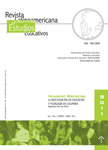##plugins.gregg.article.details.published##: 2011-01-01
Como Citar
Roldán Vargas, O., Giraldo, Y. N., & Carmona Ríos, G. (2011). -. Latinoamericana De Estudios Educativos, 7(1), 9–41. Recuperado de https://revistasojs.ucaldas.edu.co/index.php/latinoamericana/article/view/5054
Fomatos de Citação
Autores
Resumo
-
Palavras-chave
Referências
Arendt, Hannah. (2008). La promesa de la política. Barcelona: Paidós.
Bárcena, Fernando & Mèlich, Joan-Carles. (2000). La educación como acontecimiento ético. Natalidad, narración y hospitalidad. Barcelona: Paidós.
Bauman, Zygmunt. (2005). Modernidad o ambivalencia. Barcelona: Anthropos; México: Centro de Investigaciones Interdisciplinarias en Ciencias y Humanidades, Universidad Nacional Autónoma de México; Venezuela: Facultad de Ciencias Económicas y Sociales, Universidad Central de Venezuela.
Cartoriadis, Cornelis (1980). “Reflexiones sobre el desarrollo y la racionalidad”. En: Attali, Jacques, Castoriadis, Cornelius, Domenach, Jean Marie, Massé, Nathalie. El mito del desarrollo. España: Kairós.
Coffey, Amanda & Atkinson, Paul. (2003). Encontrar el sentido a los datos cualitativos. Estrategias complementarias de investigación. Medellín: Universidad de Antioquia, Facultad de Enfermería.
Frigerio, Graciela. (2005). “En la cinta de Moebius”. En: Educar: ese acto político. Buenos Aires: Del estante editorial.
Foucault, Michel. (1993). El uso de los placeres. España: Siglo XXI Editores.
Gadamer, Hans-Georg. (1998). Estética y hermenéutica. Madrid: Tecnos.
__________. (1984). Verdad y método. Salamanca: Sígueme.
Giroux, Henry. (1997). Los profesores como intelectuales. Hacia una pedagogía crítica del aprendizaje. Madrid: Paidós.
Habermas, Jürgen. (1968). “Conocimiento e interés”. En: Ciencia y técnica como ideología. Madrid: Tecnos.
Larrosa, Jorge. (2003). Entre las lenguas. Lenguaje y educación después de Babel. Barcelona: Laertes.
__________. (2004). “Notas sobre narración e identidad”. En: Abrahão, M. H. A aventura (auto) biográfica: teoria e empiria. Porto Alegre: EDIPUCRS.
Mardones, J. M. (2001). Filosofía de las ciencias humanas y sociales: materiales para una fundamentación científica. Barcelona: Anthropos.
Max-Neef, Manfred. (1998). Desarrollo a escala humana. Conceptos, aplicaciones y otras reflexiones. Uruguay: Icaria.
Mèlich, Joan-Carles. (2002). Filosofía de la finitud. Barcelona: Herder.
Nussbaum, Martha. (2010). Sin fines de lucro. Por qué la democracia necesita de las humanidades. Madrid: Katz Editores.
__________. (2002). Las mujeres y el desarrollo humano. Barcelona: Herder.
Ricoeur, Paul. (2003). Sí mismo como otro. México: Siglo XXI Editores.
Sen, Amartya. (2001). Desarrollo y libertad. Bogotá: Planeta.
Santos, Boaventura de Sousa. (2009). Pensar el estado y la sociedad: Desafíos actuales. Buenos Aires: Waldhuter Editores.
Skliar, Carlos & Larrosa, Jorge, comp. (2009). Experiencia y alteridad en educación. Argentina: Homo Sapiens Ediciones.
Skliar, Carlos y Téllez, Magaldy. (2008). Conmover la educación. Ensayos para una pedagogía de la diferencia. Buenos Aires: Noveduc.
Touraine, Alain. (1999) ¿Podremos vivir juntos? La discusión pendiente: el destino del hombre en la Aldea Global. México: Fondo de Cultura Económica.
__________. (2000) ¿Podremos vivir juntos?: iguales o diferentes. 2 ed. México: Fondo de Cultura Económica.
Vargas-Guillén, Germán, et al. (2007). Formación y subjetividad. Bogotá: Universidad Pedagógica Nacional.
Vattimo, Gianni. (1991). Ética de la interpretación. Barcelona: Paidós.
Bárcena, Fernando & Mèlich, Joan-Carles. (2000). La educación como acontecimiento ético. Natalidad, narración y hospitalidad. Barcelona: Paidós.
Bauman, Zygmunt. (2005). Modernidad o ambivalencia. Barcelona: Anthropos; México: Centro de Investigaciones Interdisciplinarias en Ciencias y Humanidades, Universidad Nacional Autónoma de México; Venezuela: Facultad de Ciencias Económicas y Sociales, Universidad Central de Venezuela.
Cartoriadis, Cornelis (1980). “Reflexiones sobre el desarrollo y la racionalidad”. En: Attali, Jacques, Castoriadis, Cornelius, Domenach, Jean Marie, Massé, Nathalie. El mito del desarrollo. España: Kairós.
Coffey, Amanda & Atkinson, Paul. (2003). Encontrar el sentido a los datos cualitativos. Estrategias complementarias de investigación. Medellín: Universidad de Antioquia, Facultad de Enfermería.
Frigerio, Graciela. (2005). “En la cinta de Moebius”. En: Educar: ese acto político. Buenos Aires: Del estante editorial.
Foucault, Michel. (1993). El uso de los placeres. España: Siglo XXI Editores.
Gadamer, Hans-Georg. (1998). Estética y hermenéutica. Madrid: Tecnos.
__________. (1984). Verdad y método. Salamanca: Sígueme.
Giroux, Henry. (1997). Los profesores como intelectuales. Hacia una pedagogía crítica del aprendizaje. Madrid: Paidós.
Habermas, Jürgen. (1968). “Conocimiento e interés”. En: Ciencia y técnica como ideología. Madrid: Tecnos.
Larrosa, Jorge. (2003). Entre las lenguas. Lenguaje y educación después de Babel. Barcelona: Laertes.
__________. (2004). “Notas sobre narración e identidad”. En: Abrahão, M. H. A aventura (auto) biográfica: teoria e empiria. Porto Alegre: EDIPUCRS.
Mardones, J. M. (2001). Filosofía de las ciencias humanas y sociales: materiales para una fundamentación científica. Barcelona: Anthropos.
Max-Neef, Manfred. (1998). Desarrollo a escala humana. Conceptos, aplicaciones y otras reflexiones. Uruguay: Icaria.
Mèlich, Joan-Carles. (2002). Filosofía de la finitud. Barcelona: Herder.
Nussbaum, Martha. (2010). Sin fines de lucro. Por qué la democracia necesita de las humanidades. Madrid: Katz Editores.
__________. (2002). Las mujeres y el desarrollo humano. Barcelona: Herder.
Ricoeur, Paul. (2003). Sí mismo como otro. México: Siglo XXI Editores.
Sen, Amartya. (2001). Desarrollo y libertad. Bogotá: Planeta.
Santos, Boaventura de Sousa. (2009). Pensar el estado y la sociedad: Desafíos actuales. Buenos Aires: Waldhuter Editores.
Skliar, Carlos & Larrosa, Jorge, comp. (2009). Experiencia y alteridad en educación. Argentina: Homo Sapiens Ediciones.
Skliar, Carlos y Téllez, Magaldy. (2008). Conmover la educación. Ensayos para una pedagogía de la diferencia. Buenos Aires: Noveduc.
Touraine, Alain. (1999) ¿Podremos vivir juntos? La discusión pendiente: el destino del hombre en la Aldea Global. México: Fondo de Cultura Económica.
__________. (2000) ¿Podremos vivir juntos?: iguales o diferentes. 2 ed. México: Fondo de Cultura Económica.
Vargas-Guillén, Germán, et al. (2007). Formación y subjetividad. Bogotá: Universidad Pedagógica Nacional.
Vattimo, Gianni. (1991). Ética de la interpretación. Barcelona: Paidós.
Downloads
Não há dados estatísticos.

 PDF (Español)
PDF (Español)
 FLIP
FLIP




















